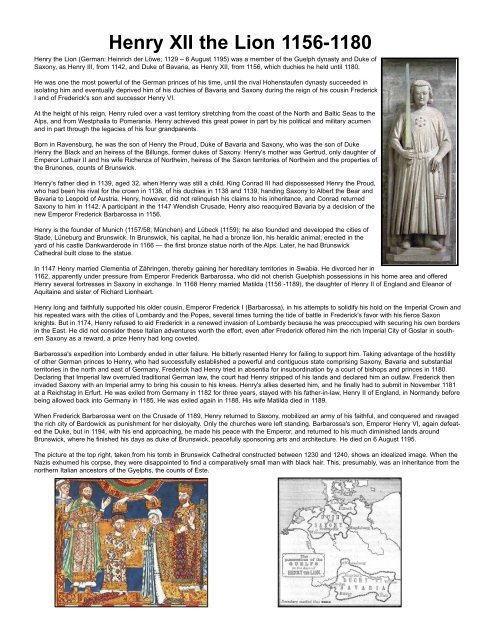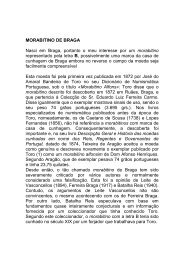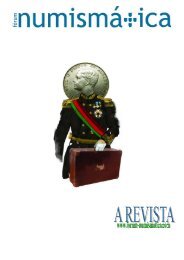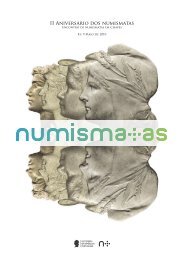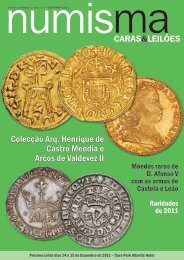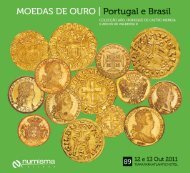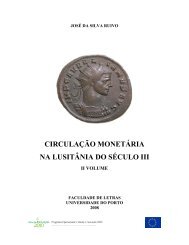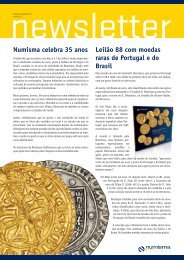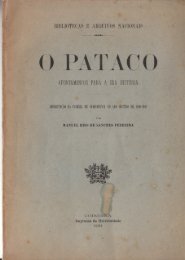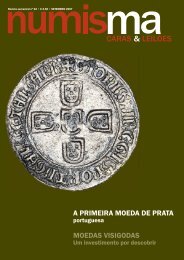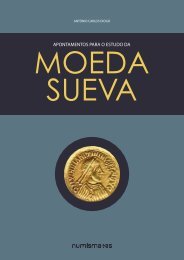You also want an ePaper? Increase the reach of your titles
YUMPU automatically turns print PDFs into web optimized ePapers that Google loves.
Henry XII the Lion 1156-1180<br />
Henry the Lion (German: Heinrich der Löwe; 1129 – 6 August 1195) was a member <strong>of</strong> the Guelph dynasty and Duke <strong>of</strong><br />
Saxony, as Henry III, from 1142, and Duke <strong>of</strong> <strong>Bavaria</strong>, as Henry XII, from 1156, which duchies he held until 1180.<br />
He was one the most powerful <strong>of</strong> the German princes <strong>of</strong> his time, until the rival Hohenstaufen dynasty succeeded in<br />
isolating him and eventually deprived him <strong>of</strong> his duchies <strong>of</strong> <strong>Bavaria</strong> and Saxony during the reign <strong>of</strong> his cousin Frederick<br />
I and <strong>of</strong> Frederick's son and successor Henry VI.<br />
At the height <strong>of</strong> his reign, Henry ruled over a vast territory stretching from the coast <strong>of</strong> the North and Baltic Seas to the<br />
Alps, and from Westphalia to Pomerania. Henry achieved this great power in part by his political and military acumen<br />
and in part through the legacies <strong>of</strong> his four grandparents.<br />
Born in Ravensburg, he was the son <strong>of</strong> Henry the Proud, Duke <strong>of</strong> <strong>Bavaria</strong> and Saxony, who was the son <strong>of</strong> Duke<br />
Henry the Black and an heiress <strong>of</strong> the Billungs, former dukes <strong>of</strong> Saxony. Henry's mother was Gertrud, only daughter <strong>of</strong><br />
Emperor Lothair II and his wife Richenza <strong>of</strong> Northeim, heiress <strong>of</strong> the Saxon territories <strong>of</strong> Northeim and the properties <strong>of</strong><br />
the Brunones, counts <strong>of</strong> Brunswick.<br />
Henry's father died in 1139, aged 32, when Henry was still a child. King Conrad III had dispossessed Henry the Proud,<br />
who had been his rival for the crown in 1138, <strong>of</strong> his duchies in 1138 and 1139, handing Saxony to Albert the Bear and<br />
<strong>Bavaria</strong> to Leopold <strong>of</strong> Austria. Henry, however, did not relinquish his claims to his inheritance, and Conrad returned<br />
Saxony to him in 1142. A participant in the 1147 Wendish Crusade, Henry also reacquired <strong>Bavaria</strong> by a decision <strong>of</strong> the<br />
new Emperor Frederick Barbarossa in 1156.<br />
Henry is the founder <strong>of</strong> Munich (1157/58; München) and Lübeck (1159); he also founded and developed the cities <strong>of</strong><br />
Stade, Lüneburg and Brunswick. In Brunswick, his capital, he had a bronze lion, his heraldic animal, erected in the<br />
yard <strong>of</strong> his castle Dankwarderode in 1166 — the first bronze statue north <strong>of</strong> the Alps. Later, he had Brunswick<br />
Cathedral built close to the statue.<br />
In 1147 Henry married Clementia <strong>of</strong> Zähringen, thereby gaining her hereditary territories in Swabia. He divorced her in<br />
1162, apparently under pressure from Emperor Frederick Barbarossa, who did not cherish Guelphish possessions in his home area and <strong>of</strong>fered<br />
Henry several fortresses in Saxony in exchange. In 1168 Henry married Matilda (1156 -1189), the daughter <strong>of</strong> Henry II <strong>of</strong> England and Eleanor <strong>of</strong><br />
Aquitaine and sister <strong>of</strong> Richard Lionheart.<br />
Henry long and faithfully supported his older cousin, Emperor Frederick I (Barbarossa), in his attempts to solidify his hold on the Imperial Crown and<br />
his repeated wars with the cities <strong>of</strong> Lombardy and the Popes, several times turning the tide <strong>of</strong> battle in Frederick's favor with his fierce Saxon<br />
knights. But in 1174, Henry refused to aid Frederick in a renewed invasion <strong>of</strong> Lombardy because he was preoccupied with securing his own borders<br />
in the East. He did not consider these Italian adventures worth the effort, even after Frederick <strong>of</strong>fered him the rich Imperial City <strong>of</strong> Goslar in southern<br />
Saxony as a reward, a prize Henry had long coveted.<br />
Barbarossa's expedition into Lombardy ended in utter failure. He bitterly resented Henry for failing to support him. Taking advantage <strong>of</strong> the hostility<br />
<strong>of</strong> other German princes to Henry, who had successfully established a powerful and contiguous state <strong>com</strong>prising Saxony, <strong>Bavaria</strong> and substantial<br />
territories in the north and east <strong>of</strong> Germany, Frederick had Henry tried in absentia for insubordination by a court <strong>of</strong> bishops and princes in 1180.<br />
Declaring that Imperial law overruled traditional German law, the court had Henry stripped <strong>of</strong> his lands and declared him an outlaw. Frederick then<br />
invaded Saxony with an Imperial army to bring his cousin to his knees. Henry's allies deserted him, and he finally had to submit in November 1181<br />
at a Reichstag in Erfurt. He was exiled from Germany in 1182 for three years, stayed with his father-in-law, Henry II <strong>of</strong> England, in Normandy before<br />
being allowed back into Germany in 1185. He was exiled again in 1188. His wife Matilda died in 1189.<br />
When Frederick Barbarossa went on the Crusade <strong>of</strong> 1189, Henry returned to Saxony, mobilized an army <strong>of</strong> his faithful, and conquered and ravaged<br />
the rich city <strong>of</strong> Bardowick as punishment for her disloyalty. Only the churches were left standing. Barbarossa's son, Emperor Henry VI, again defeated<br />
the Duke, but in 1194, with his end approaching, he made his peace with the Emperor, and returned to his much diminished lands around<br />
Brunswick, where he finished his days as duke <strong>of</strong> Brunswick, peacefully sponsoring arts and architecture. He died on 6 August 1195.<br />
The picture at the top right, taken from his tomb in Brunswick Cathedral constructed between 1230 and 1240, shows an idealized image. When the<br />
Nazis exhumed his corpse, they were disappointed to find a <strong>com</strong>paratively small man with black hair. This, presumably, was an inheritance from the<br />
northern Italian ancestors <strong>of</strong> the Gyelphs, the counts <strong>of</strong> Este.


